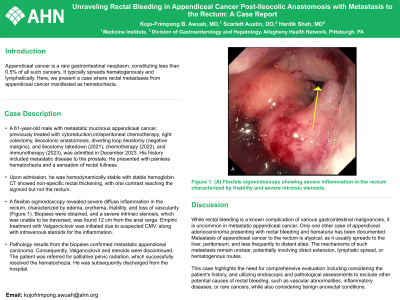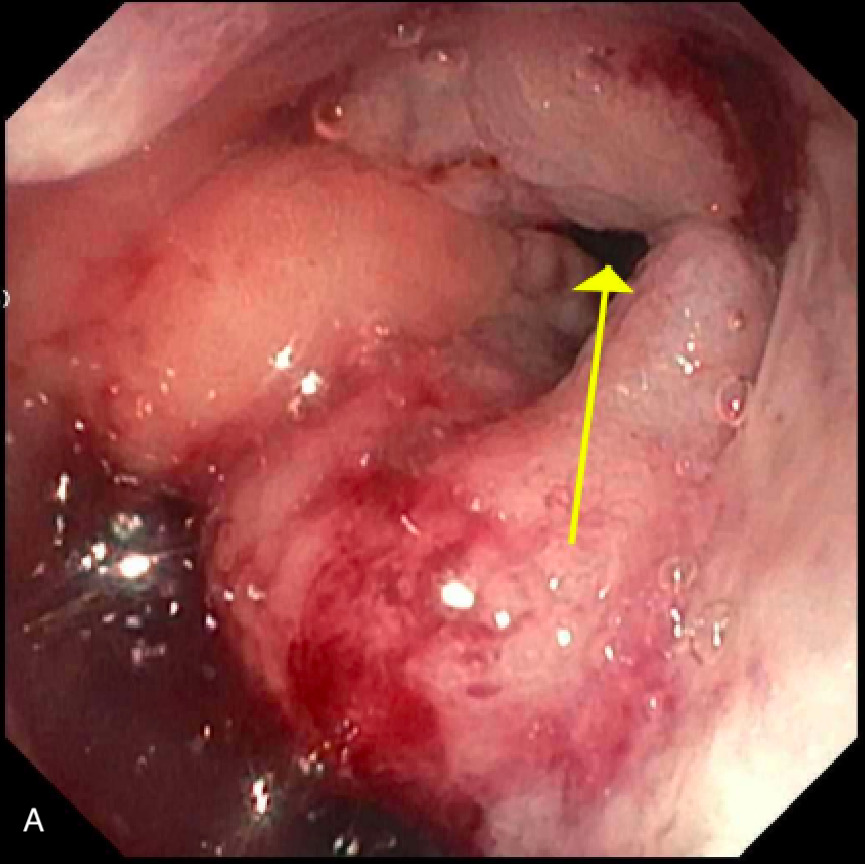Sunday Poster Session
Category: GI Bleeding
P0771 - Unraveling Rectal Bleeding in Appendiceal Cancer Post-Ileocolic Anastomosis with Metastasis to the Rectum: A Case Report
Sunday, October 27, 2024
3:30 PM - 7:00 PM ET
Location: Exhibit Hall E

Has Audio

Kojo-Frimpong B. Awuah, MD
Allegheny General Hospital
Pittsburgh, PA
Presenting Author(s)
Kojo-Frimpong B. Awuah, MD, Scarlett Austin, DO, Hardik Shah, MD
Allegheny General Hospital, Pittsburgh, PA
Introduction: Appendiceal cancer is a rare gastrointestinal neoplasm, constituting less than 0.5% of all such cancers. It typically spreads hematogenously and lymphatically. Here, we present a case where rectal metastases from appendiceal cancer manifested as hematochezia.
Case Description/Methods: A 61-year-old male with metastatic mucinous appendiceal cancer, previously treated with cytoreduction, intraperitoneal chemotherapy, right colectomy, ileocolonic anastomosis, diverting loop ileostomy (negative margins), and ileostomy takedown (2021), chemotherapy (2022), and immunotherapy (2023), was admitted in December 2023. His history included metastatic disease to the prostate. He presented with painless hematochezia and a sensation of rectal fullness.
Upon admission, he was hemodynamically stable with stable hemoglobin. CT showed non-specific rectal thickening, with oral contrast reaching the sigmoid but not the rectum.
A flexible sigmoidoscopy revealed severe diffuse inflammation in the rectum, characterized by edema, erythema, friability, and loss of vascularity (Figure 1). Biopsies were obtained, and a severe intrinsic stenosis, which was unable to be traversed, was found 12 cm from the anal verge. Empiric treatment with Valganciclovir was initiated due to suspected CMV, along with intravenous steroids for the inflammation.
Pathology results from the biopsies confirmed metastatic appendiceal carcinoma. Consequently, Valganciclovir and steroids were discontinued. The patient was referred for palliative pelvic radiation, which successfully resolved the hematochezia. He was subsequently discharged from the hospital.
Discussion: While rectal bleeding is a known complication of various gastrointestinal malignancies, it is uncommon in metastatic appendiceal cancer. Only one other case of appendiceal adenocarcinoma presenting with rectal bleeding and hematuria has been documented. Metastasis of appendiceal cancer to the rectum is atypical, as it usually spreads to the liver, peritoneum, and less frequently to distant sites. The mechanisms of such metastasis remain unclear, potentially involving direct extension, lymphatic spread, or hematogenous routes.
This case highlights the need for comprehensive evaluation including considering the patient's history, and utilizing endoscopic and pathological assessments to exclude other potential causes of rectal bleeding; such as vascular abnormalities, inflammatory diseases, or rare cancers, while also considering benign anorectal conditions.

Disclosures:
Kojo-Frimpong B. Awuah, MD, Scarlett Austin, DO, Hardik Shah, MD. P0771 - Unraveling Rectal Bleeding in Appendiceal Cancer Post-Ileocolic Anastomosis with Metastasis to the Rectum: A Case Report, ACG 2024 Annual Scientific Meeting Abstracts. Philadelphia, PA: American College of Gastroenterology.
Allegheny General Hospital, Pittsburgh, PA
Introduction: Appendiceal cancer is a rare gastrointestinal neoplasm, constituting less than 0.5% of all such cancers. It typically spreads hematogenously and lymphatically. Here, we present a case where rectal metastases from appendiceal cancer manifested as hematochezia.
Case Description/Methods: A 61-year-old male with metastatic mucinous appendiceal cancer, previously treated with cytoreduction, intraperitoneal chemotherapy, right colectomy, ileocolonic anastomosis, diverting loop ileostomy (negative margins), and ileostomy takedown (2021), chemotherapy (2022), and immunotherapy (2023), was admitted in December 2023. His history included metastatic disease to the prostate. He presented with painless hematochezia and a sensation of rectal fullness.
Upon admission, he was hemodynamically stable with stable hemoglobin. CT showed non-specific rectal thickening, with oral contrast reaching the sigmoid but not the rectum.
A flexible sigmoidoscopy revealed severe diffuse inflammation in the rectum, characterized by edema, erythema, friability, and loss of vascularity (Figure 1). Biopsies were obtained, and a severe intrinsic stenosis, which was unable to be traversed, was found 12 cm from the anal verge. Empiric treatment with Valganciclovir was initiated due to suspected CMV, along with intravenous steroids for the inflammation.
Pathology results from the biopsies confirmed metastatic appendiceal carcinoma. Consequently, Valganciclovir and steroids were discontinued. The patient was referred for palliative pelvic radiation, which successfully resolved the hematochezia. He was subsequently discharged from the hospital.
Discussion: While rectal bleeding is a known complication of various gastrointestinal malignancies, it is uncommon in metastatic appendiceal cancer. Only one other case of appendiceal adenocarcinoma presenting with rectal bleeding and hematuria has been documented. Metastasis of appendiceal cancer to the rectum is atypical, as it usually spreads to the liver, peritoneum, and less frequently to distant sites. The mechanisms of such metastasis remain unclear, potentially involving direct extension, lymphatic spread, or hematogenous routes.
This case highlights the need for comprehensive evaluation including considering the patient's history, and utilizing endoscopic and pathological assessments to exclude other potential causes of rectal bleeding; such as vascular abnormalities, inflammatory diseases, or rare cancers, while also considering benign anorectal conditions.

Figure: Figure 1: (A) Flexible sigmoidoscopy showing severe inflammation in the rectum characterized by friability and severe intrinsic stenosis.
Disclosures:
Kojo-Frimpong Awuah indicated no relevant financial relationships.
Scarlett Austin indicated no relevant financial relationships.
Hardik Shah indicated no relevant financial relationships.
Kojo-Frimpong B. Awuah, MD, Scarlett Austin, DO, Hardik Shah, MD. P0771 - Unraveling Rectal Bleeding in Appendiceal Cancer Post-Ileocolic Anastomosis with Metastasis to the Rectum: A Case Report, ACG 2024 Annual Scientific Meeting Abstracts. Philadelphia, PA: American College of Gastroenterology.
